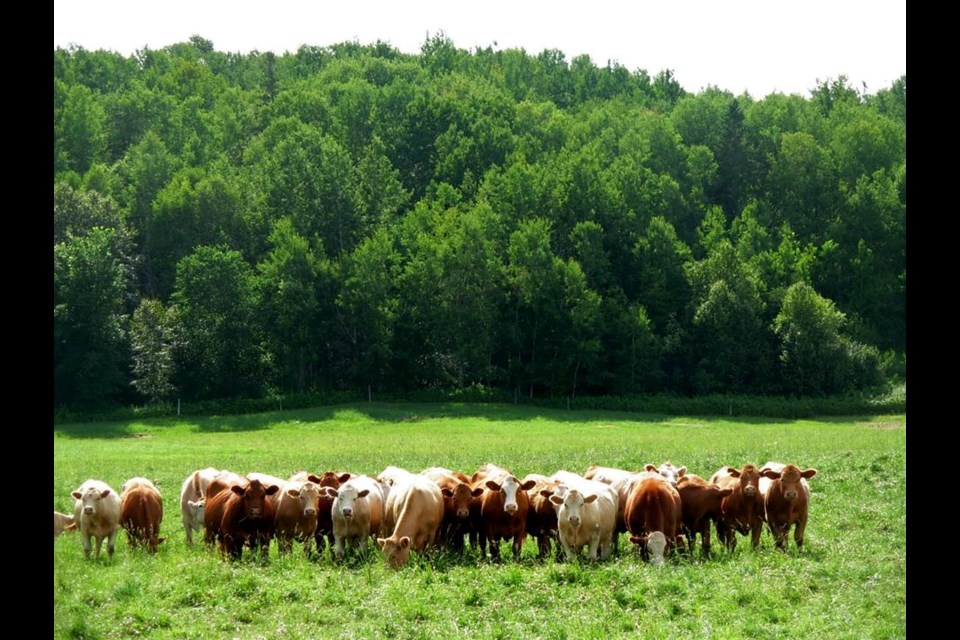Sudbury chef Craig Young was on track to open his new food truck, Friesnburgs, this fall, until the onset of COVID-19 put that dream on hold.
Instead, Young has turned his energy toward helping Northern Ontario farmers and agri-food producers reach new markets, while educating consumers about the fresh, local products available close to home.
In March, he launched Farm to Table – Northern Ontario, a public Facebook group that gives producers an easily accessible marketing platform to promote their merchandise.
Any producer in Northern Ontario is welcome to post information about their farm or operation, the products they grow, and contact information, including how buyers can purchase their goods.
Beef produced in New Liskeard, mushrooms cultivated in Markstay, cheese aged in Kapuskasing, maple syrup harvested in Sudbury, and bison raised in Earlton – they’re just a taste of the dozens of current offerings, and the available bounty of locally produced goods expands daily.
The group serves solely as a promotional tool to connect producers and consumers; it’s up to the interested parties to arrange the transactions.
In this age of technology, Young believes producers have to put their stories front and centre to remain viable in an increasingly competitive market.
“As a restauranteur, or as any business owner, if you don’t have a presence on Facebook or Instagram, a lot of times, people just don’t see you,” he said.
As social distancing and self-isolation become commonplace, some consumers prefer to stay out of mainstream grocery stores as much as possible, Young said.
Others are concerned about the potential threat to food supply chains and maintaining food security throughout Northern Ontario.
Shopping with local food producers helps with both, Young said.
If you’ve ever driven by a roadside sign promoting “fresh eggs” and hesitated about turning into the driveway to check it out, this is the opportunity to do it, he emphasized.
“Now, with what we’re going through, it’s a great time to just say, hey, what do you think would happen if you continue to not go to the farm,” Young said.
Want to read more stories about business in the North? Subscribe to our newsletter.
In the Algoma District, which includes Sault Ste. Marie and stretches north to Wawa, producers have been advocating a shop-local approach for more than a decade.
Launched by the Rural Agri-Food Innovation Network (RAIN) in the Sault, Buy Algoma, Buy Local is a print and online branding and marketing campaign to increase awareness about organizations that support local producers, and boost sales and consumption of local products.
Since 2017, RAIN has distributed 10,000 local food directories, boosted traffic on the Buy Algoma website by 30 per cent, and grown social media engagement on Facebook by 60 per cent.
David Thompson, RAIN’s research project coordinator, said Buy Algoma currently sits at around 50 members with half being regional producers.
In speaking with members, Thompson said COVID-19 has served to heighten consumer interest in locally produced food.
Producers have responded by introducing new options with online shopping, delivery, and curbside pickup.
“It is changing out of necessity,” Thompson said. “And I also find that they’re changing their marketing on social media to put more of a face and story to their brand and their products.
“That’s what we want to showcase is those stories, because consumers really, really connect with that, and to grow that relationship.”
In particular, Thompson has heard about growing demand for greens, eggs and beef.
Penokean Hills Farms, a collective of beef farmers that has focused on selling to high-end restaurants in the Toronto area, has had to shift gears and turn its attention to butchers instead, Thompson said.
Making that switch has come with its challenges, but Penokean Hills has been able to maintain demand for their product, while keeping its employees working.
For consumers, supporting local enterprises means having access to higher quality products with a longer shelf life, and the reassurance in knowing where their food is coming from.
“Having northern food producers is critical to our food security, because there are disruptions that the ag sector are having to look at,” Thompson said.
“Today it’s supply chains and getting across the border to get (equipment) picked up, and it’s these slight inconveniences maybe at this point, but it could be very disruptive.”
Thompson is also concerned about how a lack of food security could impact vulnerable populations.
He’s started an online challenge, dubbed #seedhope, to encourage people to sow some seedlings with the aim of growing food that can help alleviate the risk for those people.
When the danger of COVID-19 has passed, he’s hopeful demand for locally grown food will continue.
“Consumers are expecting a consistent product that they would get in a store, so I think if producers can respond with high-quality products at a price which is reasonable, then, yes, I would expect demand to grow,” he said.
Farm to Table has blossomed nicely since it first launched in mid-March. On April 7, the group hit a significant milestone, reaching 3,000 members.
To further boost their profile, Young said the group is thinking about a map pinpointing producers’ locations and farmer-focused videos that would tell the stories behind the products.
Like Thompson, he, too, is optimistic that this momentum has the potential to create long-term growth for the Northern Ontario food sector.
“As long as the farmer is still doing what they do, I’m just trying to find sensible streams of revenue and ways to stabilize so they can continue doing what they do.”
– Sudbury.com



